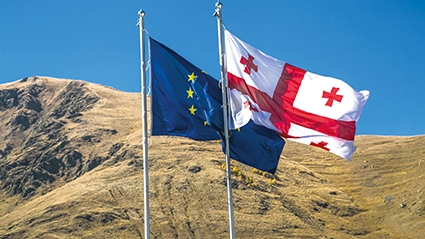A Europe in Crisis: Where Does Georgia Stand?
Europe is in crisis, begins the President of Georgia Salome Zurabishvili in her op-ed published in Le Monde, a French newspaper. Indeed, a steady increase in populism and the divisive effect of Brexit is destabilizing European ideals. Yet nonetheless, Georgia is steering itself towards the EU more than ever before.
“The European choice is easily made,” writes Zurabishvili. “Europe is synonymous with freedom: after seventy years under the Soviet totalitarian yoke and thirty years of democratic progress, our European aspiration is inseparable from the consolidation of liberal democracy.”
Zurabishvili believes that Europe will both protect and progress Georgia by bringing improvements such as new commercial opportunities, access to Erasmus programs, and the introduction of European regulations for health and safety. In addition, Europe plays an integral part in preventing Russia from continuing to encroach on Georgian territory.
Georgians predominantly support the European idea: “Georgians have been supporting EU membership with 80% for years,” writes Zurabishvili. However, despite Georgia’s pro-Europe stance, many EU member states are becoming increasingly eurosceptic and turning towards populism and nationalism.
Since the turn of the century, the number of Europeans voting for populist parties in national votes has risen from 7% to more than 25%, according to research by The Guardian. In 1998, only Switzerland and Slovakia had populist governments. Two decades later, another nine countries do.
European democracies such as Austria, Italy, and Poland now have far-right parties in government. In other countries like Germany and France, pillar countries in the EU, the far-right is becoming more and more popular. The nationalist and eurosceptic party the Front National received over 33% of the votes in the second round of elections in France in 2017.
Brexit has become a symbol of Europe’s crisis. Euroscepticism, populism, and misinformation have caused deep divisions within the UK and Europe. After years and months of Brexit-focused debates in parliament, British politicians are still unable to resolve the Brexit problem and agree on a Brexit plan, even within their own parties.
“Never since the Second World War has Europe been so necessary. And yet never has Europe been in such danger,” stated Emanuel Macron, President of France. He believes that a centrist, pro-Europe alliance is essential to stave off the populist and nationalist movements that have been gaining support across the continent.
Despite the problems the EU is currently facing, Georgia sees a European future and European integration is cemented in political rhetoric. This year, Georgia will celebrate ten years since joining the EU-led Eastern Partnership in Batumi. The government also continues to pursue European goals and implements regulations and projects with support from the EU.
Georgia’s commitment to Europe is a refreshing perspective in a eurosceptic environment. Perhaps its unique vantage point outside the EU allows Georgia to fully appreciate its benefits.
Zurabishvili believes in Europe’s need to unite: “To pull its weight against the continental states of the 21st century, Europe must embrace, not divide,” she writes. “Tomorrow’s Europe will need us all: from the stronghold of parliamentary democracy in Great Britain to the cradle of tolerance that is small Georgia.”
By Amy Jones
Image source - Emerging Europe












